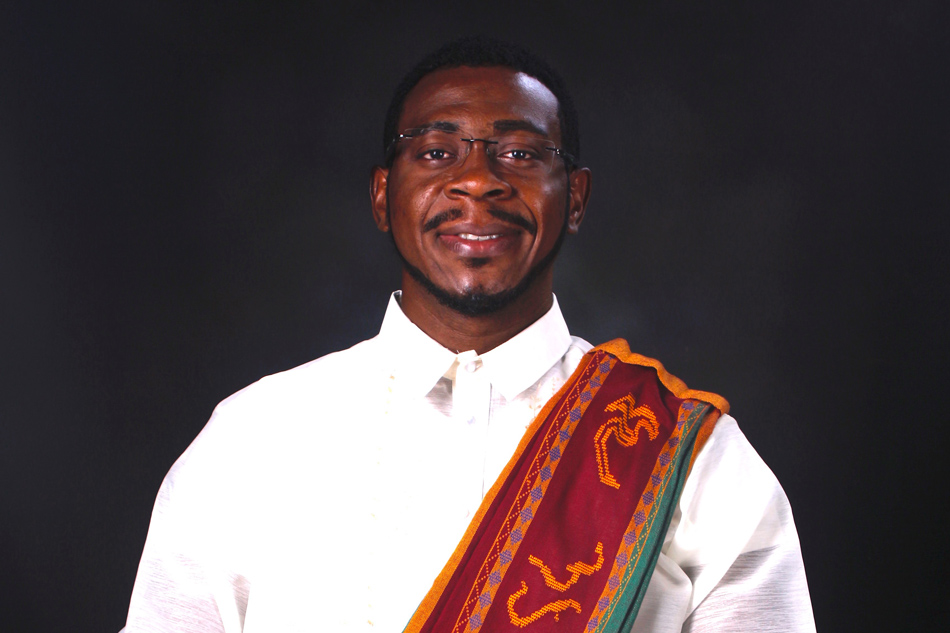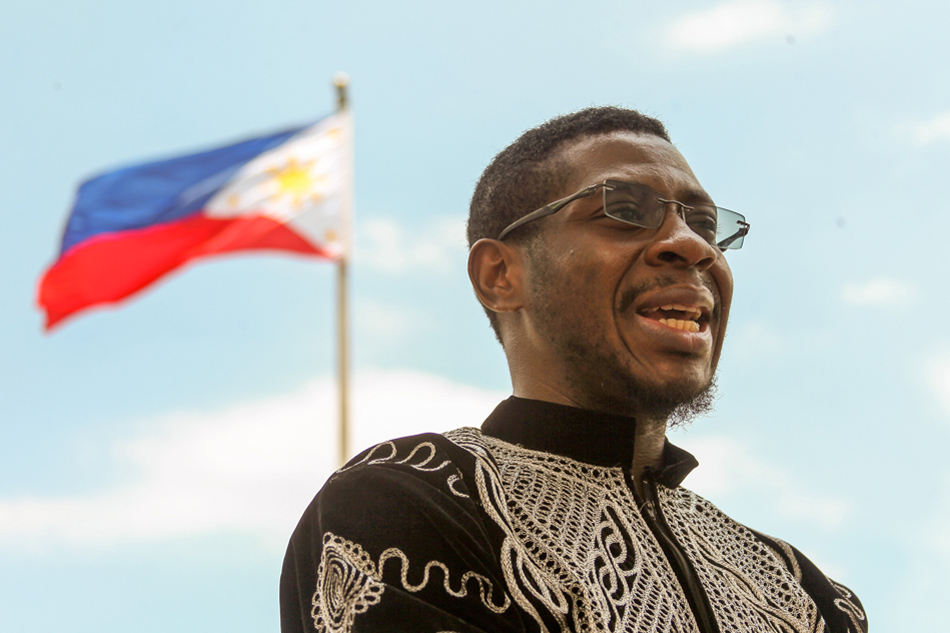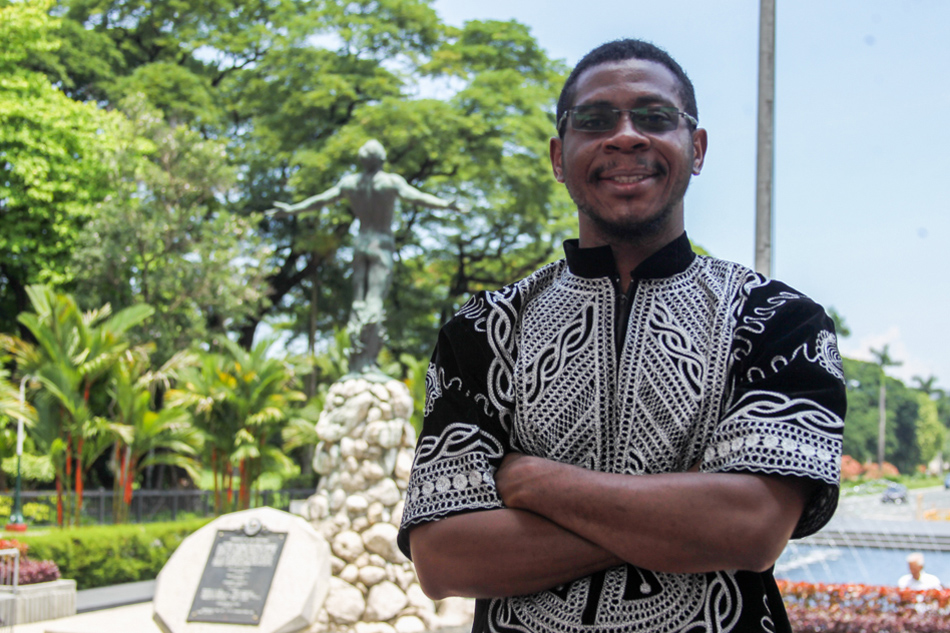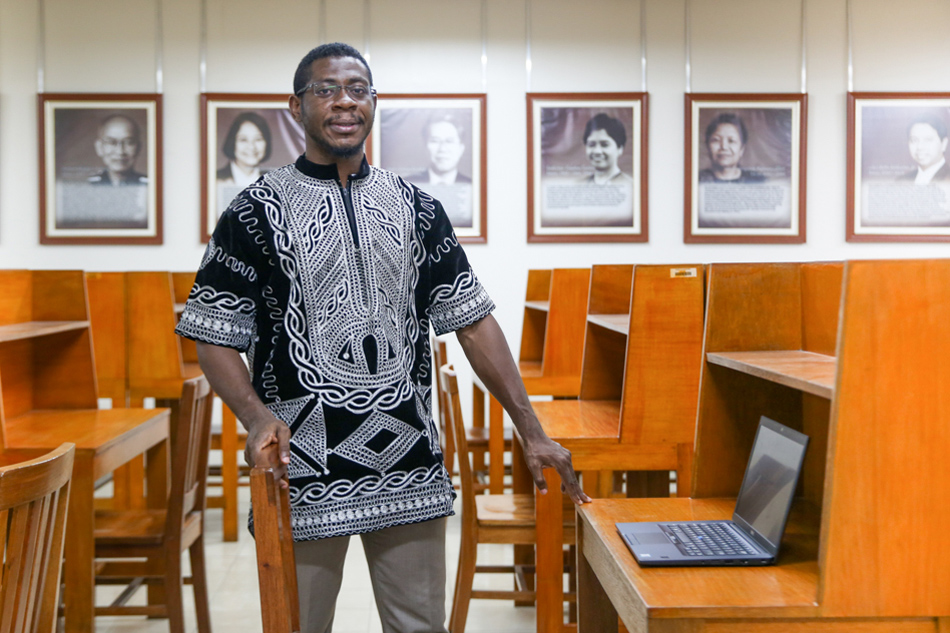PH gave me everything, says UP’s Cameroonian PhD grad
ADVERTISEMENT

Welcome, Kapamilya! We use cookies to improve your browsing experience. Continuing to use this site means you agree to our use of cookies. Tell me more!
PH gave me everything, says UP’s Cameroonian PhD grad
Kristine Sabillo,
ABS-CBN News
Published Jul 09, 2019 01:12 PM PHT
|
Updated Jul 09, 2019 01:51 PM PHT
Almost everybody knows Christel Arnaud Ngadima at the University of the Philippines’ National College of Public Administration and Governance (NCPAG).
Almost everybody knows Christel Arnaud Ngadima at the University of the Philippines’ National College of Public Administration and Governance (NCPAG).
The guard was all smiles as soon as he saw the 34-year-old Cameroon national enter the building, wearing his country’s traditional toghu top - made of intricately embroidered black fabric - and his gray backpack slung over one shoulder.
The guard was all smiles as soon as he saw the 34-year-old Cameroon national enter the building, wearing his country’s traditional toghu top - made of intricately embroidered black fabric - and his gray backpack slung over one shoulder.
At the library, Ngadima high-fived a research associate who asked him about his plans for the future.
At the library, Ngadima high-fived a research associate who asked him about his plans for the future.
“Congratulations!” a couple of employees fondly greeted the bespectacled Cameroonian, who had graduated from UP last June alongside 5,000 others.
“Congratulations!” a couple of employees fondly greeted the bespectacled Cameroonian, who had graduated from UP last June alongside 5,000 others.
ADVERTISEMENT
What sets Ngadima apart from the thousands of UP graduates, in addition to his nationality, is the fact that he is among the first from his country to receive a doctorate in public administration.
What sets Ngadima apart from the thousands of UP graduates, in addition to his nationality, is the fact that he is among the first from his country to receive a doctorate in public administration.
FINDING LOVE
Ngadima first came to the Philippines in 2011 as a missionary student. While serving his church, he took up his second master’s degree – his first was on law -- in divinity from the Adventist International Institute of Advanced Studies in Silang, Cavite.
Ngadima first came to the Philippines in 2011 as a missionary student. While serving his church, he took up his second master’s degree – his first was on law -- in divinity from the Adventist International Institute of Advanced Studies in Silang, Cavite.
It was there that he met the Filipina who was to be his wife.
It was there that he met the Filipina who was to be his wife.
“I met a girl who was always faithful going to church early and doing activities, praying. I was caught by that kind of devotion,” Ngadima said.
“I met a girl who was always faithful going to church early and doing activities, praying. I was caught by that kind of devotion,” Ngadima said.
Since being wed in 2012, they now have two children, with another one coming soon.
Since being wed in 2012, they now have two children, with another one coming soon.
ADVERTISEMENT
While living with his wife in her home province of Aklan, Ngadima applied to teach public administration at the school where she worked. But he was underqualified; the school’s dean said they were looking for someone who had a Ph.D.
While living with his wife in her home province of Aklan, Ngadima applied to teach public administration at the school where she worked. But he was underqualified; the school’s dean said they were looking for someone who had a Ph.D.
After looking at his options, Ngadima decided that the best way for him to get a doctorate was through the UP NCPAG, the first school of public administration in Asia.
After looking at his options, Ngadima decided that the best way for him to get a doctorate was through the UP NCPAG, the first school of public administration in Asia.
SEARCH FOR ANSWERS
“The motivation for me to study public administration came as a result of trying to understand the situation back home in Cameroon,” he said.
“The motivation for me to study public administration came as a result of trying to understand the situation back home in Cameroon,” he said.
Ngadima, a lawyer by profession, said a Ph.D. in public administration is not offered in Cameroon universities where civil servants are only expected to pursue their bachelor’s and master’s degrees.
Ngadima, a lawyer by profession, said a Ph.D. in public administration is not offered in Cameroon universities where civil servants are only expected to pursue their bachelor’s and master’s degrees.
Just before he started studying at UP in 2014, Ngadima went home to Cameroon to renew his passport and introduce his wife and daughter to his parents.
Just before he started studying at UP in 2014, Ngadima went home to Cameroon to renew his passport and introduce his wife and daughter to his parents.
ADVERTISEMENT
“The three months we spent there (Cameroon) was really a time for me to understand the context and see what I am going to study,” Ngadima said.
“The three months we spent there (Cameroon) was really a time for me to understand the context and see what I am going to study,” Ngadima said.
Ngadima explained that his country, located in Central Africa, is rich in natural resources. However, he said Cameroon remains underdeveloped. On top of that, there have been lingering tensions between the side of Cameroon that were once colonized by the French and the other side once colonized by the British.
Ngadima explained that his country, located in Central Africa, is rich in natural resources. However, he said Cameroon remains underdeveloped. On top of that, there have been lingering tensions between the side of Cameroon that were once colonized by the French and the other side once colonized by the British.
“The English part of Cameroon (is) claiming that they are being marginalized by the French system (of government),” he said. Currently, Cameroon has a unitary presidential republic, with both a president and a prime minister.
“The English part of Cameroon (is) claiming that they are being marginalized by the French system (of government),” he said. Currently, Cameroon has a unitary presidential republic, with both a president and a prime minister.
“One of the main complaints of the English part of Cameroon is that the unitary form of governance does not give the local population direct decision and power,” he added.
“One of the main complaints of the English part of Cameroon is that the unitary form of governance does not give the local population direct decision and power,” he added.
And so for four years, Ngadima and his family relocated to Quezon City so he could study public administration while serving his church. For his dissertation, he studied how the Philippines’ Kalahi-CIDSS program, a poverty alleviation program of the government, was being implemented in the country.
And so for four years, Ngadima and his family relocated to Quezon City so he could study public administration while serving his church. For his dissertation, he studied how the Philippines’ Kalahi-CIDSS program, a poverty alleviation program of the government, was being implemented in the country.
ADVERTISEMENT
Ngadima said he became interested in community development because he believes that “for a country, a community to be developed we need two things: transfer of power to local people and transfer of resources.”
Ngadima said he became interested in community development because he believes that “for a country, a community to be developed we need two things: transfer of power to local people and transfer of resources.”
“And this (community development) is what is missing in our system because our people don’t have the power to decide. They don’t have the resources for development. And I think if this can be shared to my people in Cameroon something can also come from it,” he said.
“And this (community development) is what is missing in our system because our people don’t have the power to decide. They don’t have the resources for development. And I think if this can be shared to my people in Cameroon something can also come from it,” he said.
GRATEFUL
Ngadima said he did not know what to expect when he first came to the Philippines because of its negative image in international media and even here.
Ngadima said he did not know what to expect when he first came to the Philippines because of its negative image in international media and even here.
But he never had a bad experience in the eight years that he lived here.
But he never had a bad experience in the eight years that he lived here.
“The Philippines has given me everything. The Philippines has given me education. The Philippines has given me a wonderful family. And these are the only things a person needs in the world,” Ngadima said.
“The Philippines has given me everything. The Philippines has given me education. The Philippines has given me a wonderful family. And these are the only things a person needs in the world,” Ngadima said.
ADVERTISEMENT
“My stay here in the past eight years so far has been a blessing.”
“My stay here in the past eight years so far has been a blessing.”
Last June, Ngadima's parents went on their first overseas trip and flew to the Philippines to witness his graduation. Just this weekend, he brought them to Boracay, which is in his wife's home province of Aklan.
Last June, Ngadima's parents went on their first overseas trip and flew to the Philippines to witness his graduation. Just this weekend, he brought them to Boracay, which is in his wife's home province of Aklan.
Asked what his future plans are, Ngadima, who started working at a call center handling French accounts six months ago, said it is his turn to support his wife, who is currently taking her doctorate in education at UP.
Asked what his future plans are, Ngadima, who started working at a call center handling French accounts six months ago, said it is his turn to support his wife, who is currently taking her doctorate in education at UP.
Ngadima said he never planned to go to the Philippines because all he saw in the news was about natural disasters and poverty in the country. “But the good side of the Philippines, the nice people you don’t see them portrayed in the media...my wife is living proof of that.”
Ngadima said he never planned to go to the Philippines because all he saw in the news was about natural disasters and poverty in the country. “But the good side of the Philippines, the nice people you don’t see them portrayed in the media...my wife is living proof of that.”
“I think God led me to the Philippines because he has better plans for me,” Ngadima said. “That’s why when I am asked about my plans, I always remember that I have my own plan but God has better (plans).”
“I think God led me to the Philippines because he has better plans for me,” Ngadima said. “That’s why when I am asked about my plans, I always remember that I have my own plan but God has better (plans).”
ADVERTISEMENT
He is hoping that those plans would eventually lead him back to Cameroon or use what he has learned to help his country.
He is hoping that those plans would eventually lead him back to Cameroon or use what he has learned to help his country.
Read More:
Christel Ngadima
University of the Philippines
Cameroon
NCPAG
UP
National College of Public Administration and Governance
ADVERTISEMENT
ADVERTISEMENT






